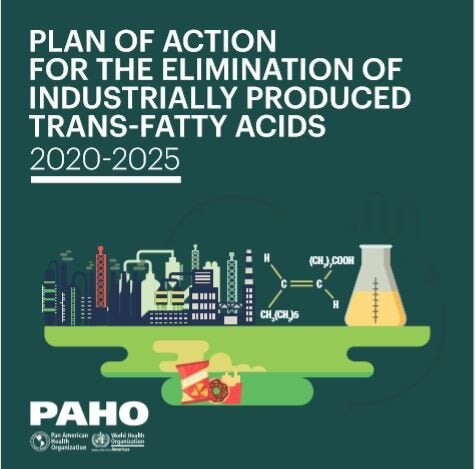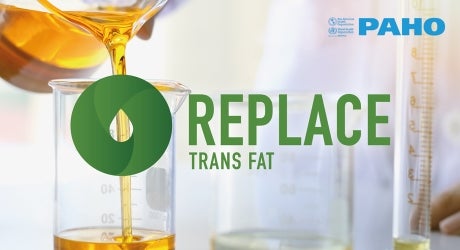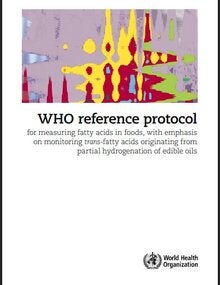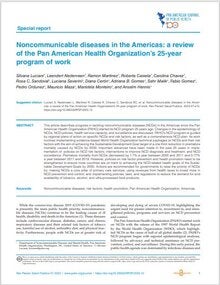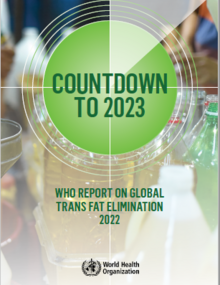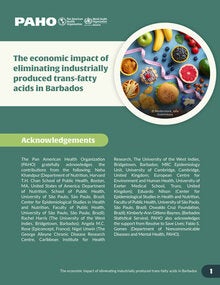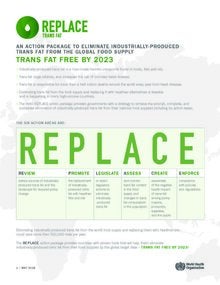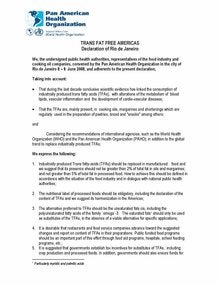The elimination of industrially produced trans fatty acids (IP-TFA) is recommended by the World Health Organization (WHO) and the Pan American Health Organization (PAHO) to prevent non communicable diseases, such as coronary heart disease.
Increased intake of trans fat (>1% of total energy intake) is associated with increased risk of coronary heart disease mortality and events. Trans-fatty acids (TFA) intake is responsible for more than 500,000 premature deaths from coronary heart disease each year around the world.
The elimination of trans fats from the food supply is feasible through policy approaches, including the use of legislative or regulatory measures to limit IP-TFA to no more than 2 grams/100 grams (2%) of total fat in all food products; ban partially hydrogenated oils, the major source of IP-TFA; and/or a combination of the two policies aforementioned.
- Industrially-produced trans fat is a man-made harmful compound found in foods, fats and oils.
- Trans fat clogs arteries and increases the risk of coronary heart disease.
- Increased intake of trans fat (>1% of total energy intake) is associated with increased risk of coronary heart disease mortality and events.
- Eliminating trans fat from the food supply and replacing it with healthier alternatives is feasible and is happening in many high-income countries.
Globally, the best available estimate using a comprehensive analytic approach suggests that in 2010, 537,000 deaths from CHD were attributable to TFA intake; of these, 160,000 occurred in the Region of the Americas, 45% prematurely.
National policy commitment to eliminate TFA: National policies, strategies or action plans express a commitment to reduce industrially produced TFA in the food supply
Other complementary measures: Legislative or other measures have been adopted to encourage consumers to make healthier choices with regard to industrially produced TFA or mandatory limits on industrially produced TFA in foods in specific settings
Less restrictive TFA limits: Legal measures have been adopted to limit industrially produced TFA in foods in all settings, but these are less restrictive than the recommended approach
Best-practice TFA policies: Legislative measures have been adopted to limit industrially produced TFA in foods in all settings, and these are in line with the recommended approach
Best-practice TFA policy passed but not yet in effect
Monitoring mechanism for mandatory TFA limits
An extensive body of evidence has demonstrated the negative metabolic effects of TFA, as well as the association between total TFA intake and CHD. High TFA intake significantly increases the risk of death from any cause by 34%, the risk of CHD death by 28%, and the risk of CHD occurrence by 21%. Non-significant increases of 7% for ischemic stroke and 10% for diabetes were also noted.
TFA increases low-density lipoprotein (LDL) cholesterol levels, the most harmful type, while lowering beneficial high-density lipoprotein (HDL) cholesterol levels, to an even greater extent than saturated fats.
PAHO has launched the Plan of Action for the Elimination of Industrially Produced Trans-Fatty Acids 2020-2025. It intends to provide guidance and monitoring to PAHO Member States in the elimination of industrially produced trans-fatty acids.
PAHO is also launching a virtual course on the WHO REPLACE action package to eliminate IP-TFA to advance on the Regional nutrition agenda and country capacity building on the strategies of eliminating IP-TFA from the food supply under the PAHO Plan of Action for the Elimination of IP-TFA.


